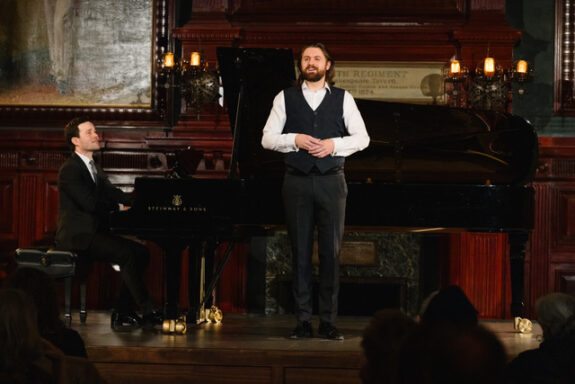 United States Schubert, Loewe, Vaughan Williams: Konstantin Krimmel (baritone), Ammiel Bushakevitz (piano). Park Avenue Armory, New York, 24.2.2025. (RP)
United States Schubert, Loewe, Vaughan Williams: Konstantin Krimmel (baritone), Ammiel Bushakevitz (piano). Park Avenue Armory, New York, 24.2.2025. (RP)

Schubert – ‘Der Wanderer’ D.489; ‘An den Mond’ D.193; ‘Hoffnung’ D.637; ‘Der Jüngling an der Quelle’ D.300; ‘Auf der Donau’ D.553; ‘Der König in Thule’ D.367; ‘Die Gruppe aus dem Tartarus’ D.583; ‘Nachstϋck’ D.672; ‘Erlkönig’ D.328
Loewe – ‘Herr Oluf’ Op.2 No.2; ‘Der du von dem Himmel bist’ Op.9 H.1 Nr.3b; ‘Erlkönig’ Op.1 No.3; ‘Geisterleben’ Op.9 No.4; ‘Der Totentanz’ Op.44 No.3
Vaughan Williams – Songs of Travel
Prestigious awards, rave reviews and praise-worthy recordings preceded German baritone Konstantin Krimmel’s first North American recitals with Israeli-South African pianist Ammiel Bushakevitz. The rising German singer was in glorious voice and blazed through a turbulent, emotionally-charged program of songs by Schubert, Loewe and Vaughan Williams at the Park Avenue Armory, meeting, if not surpassing, all expectations. Bushakevitz’s commanding performance was no less impressive.
Krimmel has a full-bodied baritone which he employs to express emotion through ever-changing vocal colorations and an equally broad dynamic range. Words are projected with pointillistic precision while the flow of the musical line is always maintained. Bushakevitz brings the same qualities to the playing, especially his exceptional attention to detail and his sense of drama.
The singer and pianist envisioned the program as a journey from the opening measures of Schubert’s ‘Der Wanderer’ to the terrifying conclusion of ‘Erlkönig’ by the same composer. The distinction is necessary, as they also performed Carl Loewe’s setting of Goethe’s poem. To sustain the mood – tension is a more fitting term – Krimmel and Bushakevitz remained in character between songs and for the entirety of each half of the recital.
‘Der Wanderer’ set the recital’s theme and mood. Krimmel sang the opening measures in a pale, wan, seemingly spent voice that captured the drifter’s cheerless restiveness. His voice was devoid of color as he ruefully and quietly expressed the man’s realization that happiness existed everywhere but within him.
In ‘Der Jüngling an der Quelle’, Krimmel’s voice danced effortlessly over Bushakevitz’s sparkling accompaniment in which longing replaced the despair of the prior songs. It was a special atmosphere to which they would return in ‘The Infinite Shining Heavens’ from Vaughan Williams’s Songs of Travel, in which Krimmel captured a star falling to earth through the colors in his voice.
Baritones with a flair for drama tend to gravitate towards Loewe’s ballads. He composed over 400 songs and was dubbed the ‘Schubert of North Germany.’ Loewe was born in 1796, the year before Schubert, whom he outlived by forty years. A close friend of Robert Schumann, Weber and Mendelssohn, Loewe conducted the first performance of the latter’s A Midsummer Night’s Dream Overture.
Krimmel sang two of Loewe’s greatest ballads, ‘Herr Oluf’ and ‘Der Totentanz’ as well as his ‘Erlkönig’, which Goethe deemed superior to Schubert’s. The similarities in the settings are inherent in the poem, especially in the musical depictions of the four characters – narrator, father, son and Erl King – whom Krimmel etched in distinct vocal colors. The song culminated with a horrific scream from the child, followed by a frantic gallop in the piano that ended only with the father’s realization that his child was dead.
In Vaughan Williams’s Songs of Travel, Krimmel gave voice to a heartier man for whom the open road is home, revealing his resolve and his regrets. There was metal in Krimmel’s voice as he expressed the traveler’s disregard for the weather in ‘The Vagabond’, but gold in the opening lines of ‘Bright is the Ring of Words’ which rang out thrilling and free.
Soft, lovely tones conveyed wistfulness when Krimmel sang of nature’s marvels in ‘Let Beauty Awake’. During ‘In Dreams’, there was anguish in his voice when singing of a cavalier farewell to a girl, with Bushakevitz underscoring the man’s hope that she remembers him still with simple, eloquent playing. In ‘I have trod the Upward and the Downward Slope’, the final words evaporated into thin air as Bushakevitz began the postlude, which recalled all that had gone before on this journey.

Krimmel and Bushakevitz returned to Schubert to end the recital. In ‘Die Gruppe aus dem Tartarus’, singer and pianist painted the pain and desperation of the dead suffering the most horrific tortures imaginable with spine-chilling intensity. The release of energy on the climatic ‘Ewigkeit’ (‘Eternity’) was as dazzling as it was nightmarish.
The emotional tumult of ‘Die Gruppe aus dem Tartarus’ paled compared to the impact of Krimmel and Bushakevitz’s performance of Schubert’s ‘Erlkönig’. From the first notes of the introduction, Bushakevitz propelled the story forward with unrelenting energy and force. Krimmel delineated the characters to a degree, but this was full-blooded singing with no gimmicks employed to achieve an effect. The child’s despair was a desperate, overpowering scream sung in full voice. It was the stuff of which nightmares are made.
Vaughan Willams’s ‘Silent Noon’ was the sole encore, which Krimmel promised would dispel the gloom cast by the recital. And so it did, with Krimmel caressing the sound of love in soft, shimmering tones to tender, shimmering sounds from the piano.
Rick Perdian
